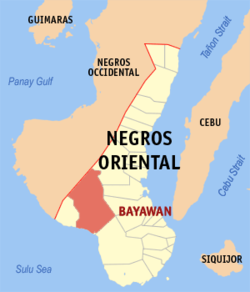Bayawan
| Bayawan | ||
|---|---|---|
| Component City | ||
| City of Bayawan Lungsod ng Bayawan (Tagalog) Dakbayan sa Bayawan (Cebuano) |
||

Bayawan City Hall
|
||
|
||
 Map of Negros Oriental showing the location of Bayawan |
||
| Location within the Philippines | ||
| Coordinates: 09°22′N 122°48′E / 9.367°N 122.800°ECoordinates: 09°22′N 122°48′E / 9.367°N 122.800°E | ||
| Country | Philippines | |
| Region | Negros Island Region (NIR/Region XVIII) | |
| Province | Negros Oriental | |
| District | 3rd district of Negros Oriental | |
| Incorporated (town) | 1872 | |
| Cityhood | December 23, 2000 | |
| Barangays | 28 | |
| Government | ||
| • Mayor | Ismael Martinez | |
| Area | ||
| • Total | 699.08 km2 (269.92 sq mi) | |
| Elevation | 2 m (7 ft) | |
| Population (2015) | ||
| • Total | 117,900 | |
| • Density | 170/km2 (440/sq mi) | |
| Time zone | PST (UTC+8) | |
| Zip code | 6221 | |
| Area code | 35 | |
| Income class | 2nd class | |
| Languages | Cebuano, Hiligaynon (Ilonggo), Filipino, English | |
| Website | www |
|
Bayawan, officially the City of Bayawan or simply Bayawan City, is a second-class component city in the 3rd Congressional District of the province of Negros Oriental, Philippines. At the 2015 census, it had a population of 117,900 people.
Bayawan is located about 100 kilometres (62 mi) from the Dumaguete City, the provincial capital and near the provincial border with Negros Occidental. It is a coastal city with a land area of 69,908 hectares (172,750 acres), the largest in the province.Mabinay bounds it to the north, Tanjay City and Bais City to the east, Sta. Catalina to the southeast and Basay to the west and it also shares a boundary with Kabankalan City of Negros Occidental on the northwest.
Bayawan used to be known as New Tolong, and only had its modern name starting 1952.
Bayawan City has two distinct climate seasons: the dry season, well pronounced in the months of January to May; and the wet season, in the months of June to December.
Bayawan became a chartered city in December 2000. It boasts its distinction as a "Character City" (International Association of Character Cities) and a pioneer "Healthy City" (DOH certified) in the Philippines. Recently, the Asian Institute of Management recognized the city as "one of the Top 10 Best Cities to Live In in the Philippines (Small Cities Category)" under its Competitive Cities Survey 2007.
It was in 1751 when the Spanish friars first established their settlement. 116 years later, Tolong Nuevo (Bayawan’s former name) had existed as early as 1868 as part of Tolong Viejo (now the Municipality of Sta. Catalina). It was not until 1872 when she was formally organized as a pueblo.
In 1953, the name Tolong Nuevo was changed to Bayawan, by virtue of Republic Act 694 as approved by the 3rd congress of the Philippines, consigning the name “Tolong” into obscurity and deep oblivion soon slowly to be forgotten by the succeeding generations.
...
Wikipedia


